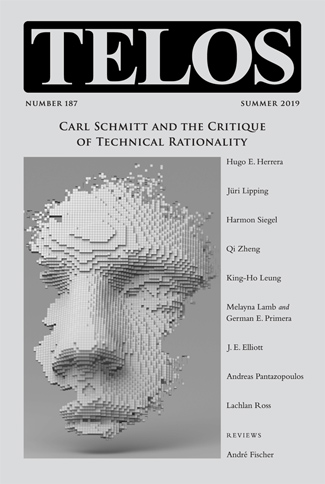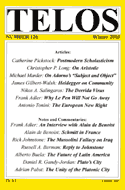Melayna Lamb and German E. Primera’s “Sovereignty between the Katechon and the Eschaton: Rethinking the Leviathan” appears in Telos 187 (Summer 2019). Read the full article at the Telos Online website, or purchase a print copy of the issue in our online store. Individual subscriptions to Telos are available in both print and online formats.
 This paper both rejects the reading of Thomas Hobbes’s Leviathan as a secularized katechon and rethinks anew the questions of sovereignty and politics in his thought. It does so by examining the eschatological character of his politico-theological understanding of the relation between the kingdom of the Leviathan and the kingdom of God. Indeed, through different contemporary readings of Hobbes’s theory of the state, this paper offers an insight into the concrete eschatology at operation in Hobbes’s thought and underscores its relevance for the understanding of government, biopolitics, and sovereignty. This is achieved through two different, albeit interconnected undertakings, which in turn allow us to agree but also to go beyond Giorgio Agamben’s claim that the state, in Hobbes, does not have a katechontic function. The first is an exposition of the a-teleological character of Hobbes’s eschatology and his metaphysics of motion. The second involves a consideration of the temporality and the nature of the relation between the ahistorical world of reason and the historical world of faith that underpins Hobbes’s theory of the state. Contrary to the contemporary interpretations in which Hobbes’s eschatology is presented as future regarding, we will highlight the chronological coincidence between the historical time of faith and the ahistorical time of the Leviathan, placing Hobbes within the political coordinates of Walter Benjamin’s messianism. By bringing this eschatological perspective to the fore, not only will the reading of Hobbes’s theory of sovereignty that aligns him with liberalism be problematized, but also an analysis of the resources that Hobbes offers to imagine a different form of politics will be developed.
This paper both rejects the reading of Thomas Hobbes’s Leviathan as a secularized katechon and rethinks anew the questions of sovereignty and politics in his thought. It does so by examining the eschatological character of his politico-theological understanding of the relation between the kingdom of the Leviathan and the kingdom of God. Indeed, through different contemporary readings of Hobbes’s theory of the state, this paper offers an insight into the concrete eschatology at operation in Hobbes’s thought and underscores its relevance for the understanding of government, biopolitics, and sovereignty. This is achieved through two different, albeit interconnected undertakings, which in turn allow us to agree but also to go beyond Giorgio Agamben’s claim that the state, in Hobbes, does not have a katechontic function. The first is an exposition of the a-teleological character of Hobbes’s eschatology and his metaphysics of motion. The second involves a consideration of the temporality and the nature of the relation between the ahistorical world of reason and the historical world of faith that underpins Hobbes’s theory of the state. Contrary to the contemporary interpretations in which Hobbes’s eschatology is presented as future regarding, we will highlight the chronological coincidence between the historical time of faith and the ahistorical time of the Leviathan, placing Hobbes within the political coordinates of Walter Benjamin’s messianism. By bringing this eschatological perspective to the fore, not only will the reading of Hobbes’s theory of sovereignty that aligns him with liberalism be problematized, but also an analysis of the resources that Hobbes offers to imagine a different form of politics will be developed.
 A recent Colombian periodical announced the news: by the end of 2011, the country’s capital, Bogotá, reported an unemployment rate, at least by official accounts, 0.3% lower than that of the United States. The headlines, mediatic as they may intend, aim at fixing in print the dynamics of a continental reality: while European and American economies struggle with unprecedented crises, at least eight Latin American economies closed the year, according to the Centre for Latin American Studies (CESLA), with above average growth.
A recent Colombian periodical announced the news: by the end of 2011, the country’s capital, Bogotá, reported an unemployment rate, at least by official accounts, 0.3% lower than that of the United States. The headlines, mediatic as they may intend, aim at fixing in print the dynamics of a continental reality: while European and American economies struggle with unprecedented crises, at least eight Latin American economies closed the year, according to the Centre for Latin American Studies (CESLA), with above average growth. 






